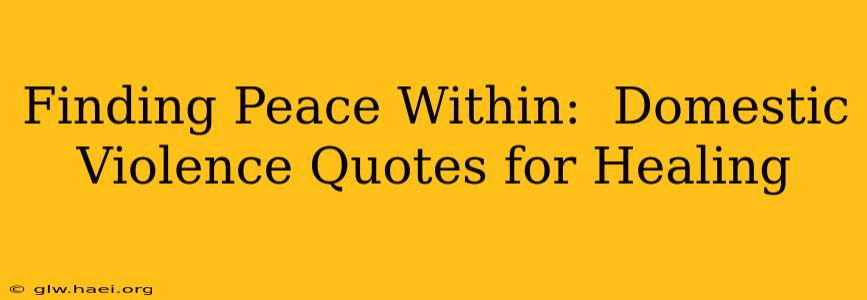The journey to healing from domestic violence is unique and deeply personal. There's no single timeline, no magic cure, only a commitment to rebuilding your life, piece by piece. Words, particularly those from others who understand, can offer solace, strength, and a sense of shared experience. This collection of quotes isn't just about the pain; it's about the resilience, the hope, and the profound possibility of finding peace within yourself.
It’s important to remember that you are not alone. Millions have walked this path, and countless resources are available to support you. If you or someone you know is experiencing domestic violence, please seek help. You deserve safety, peace, and a life free from fear.
What are the stages of healing from domestic abuse?
The healing process from domestic violence is rarely linear. It's more like a winding path with ups and downs. Some common stages include:
- Denial and Minimization: Initially, you might try to downplay the abuse or convince yourself it wasn't that bad. This is a common defense mechanism.
- Anger and Resentment: As the reality of what happened sinks in, intense anger and resentment towards the abuser are common.
- Grief and Loss: You'll likely grieve the loss of the relationship, your sense of safety, and perhaps even a part of yourself.
- Acceptance and Forgiveness: This doesn't mean condoning the abuse, but rather accepting what happened and finding a way to move forward. Forgiveness, importantly, is often for yourself, releasing the weight of the past.
- Reconstruction and Empowerment: This is the stage where you rebuild your life, set boundaries, and find strength in yourself.
What kind of therapy helps with domestic violence trauma?
Several therapeutic approaches can be incredibly beneficial in healing from domestic violence. These include:
- Trauma-focused therapy: This type of therapy helps you process the trauma you've experienced, develop coping mechanisms, and address any resulting PTSD symptoms.
- Cognitive Behavioral Therapy (CBT): CBT helps you identify and change negative thought patterns and behaviors that might be hindering your healing.
- Group therapy: Connecting with others who have had similar experiences can provide invaluable support and a sense of community.
How do I forgive myself after domestic violence?
Forgiving yourself after domestic violence is a crucial step in the healing process. It's important to remember that you are not responsible for the abuse you experienced. You deserve compassion and understanding, especially from yourself. Self-forgiveness is often a gradual process that involves:
- Self-compassion: Treat yourself with the same kindness and understanding you would offer a friend going through a similar experience.
- Identifying and challenging negative self-talk: Become aware of your inner critic and actively challenge its negative messages.
- Acceptance: Accept that you did the best you could in a difficult situation.
How can I move on from domestic abuse?
Moving on from domestic abuse is a journey, not a destination. It requires courage, strength, and self-compassion. Some steps you can take include:
- Seeking professional help: Therapists and support groups can provide invaluable guidance and support.
- Building a strong support network: Surround yourself with supportive friends, family, and community resources.
- Focusing on self-care: Prioritize activities that nurture your physical, emotional, and mental well-being.
- Setting boundaries: Learn to establish and maintain healthy boundaries in your relationships.
- Focusing on your goals: Set personal and professional goals to help you regain a sense of purpose and direction.
Remember: Your healing journey is valid and important. Take it one day at a time, be kind to yourself, and know that brighter days are ahead.

